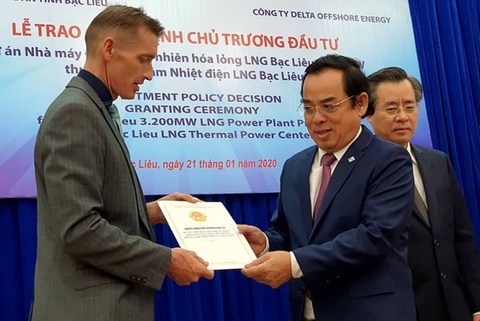
The Bac Lieu Province People’s Committee issues an investment certificate to Singapore’s Delta Offshore Energy Pte Ltd Co for an LNG-fired power plant. — Photo courtesy of Bac Lieu People’s Committee
The Bac Lieu People’s Committee hopes the licence it granted to a Singapore company for a liquefied natural gas-fired (LNG) power plant in the province is going to be a significant factor in attracting further foreign investment.
Last month, the province approved the construction of the plant by Delta Offshore Energy Pte.Ltd (DOE), the largest foreign project in the Cuu Long (Mekong) Delta to date, according to the committee.
Duong Thanh Trung, the chairman of the province, hoped the plant, worth some US$4 billion, would help change the province’s economic structure.
It is expected to create thousands of jobs and contribute more than VND3 trillion ($129.6 million) a year to the State budget, he said.
He urged DOE and its partners to ensure the project progresses on schedule, promising them most favourable conditions possible.
The 3,200MW plant will have four turbines of 750MW each and one with a capacity of 200MW, the former to go on stream at the end of 2023 and the latter in 2027.
Bac Lieu wants to attract investments in certain sectors such as renewable energy, hi-tech agriculture, trade, services, tourism, education, and healthcare, Trung said.
The province aims to become a regional and national energy hub by 2030, he added.
Bac Lieu has a 56km coastline where the wind blows steadily, making it ideal for generating renewable energy.
The project has lifted the province to 21st position from 44th in cumulative foreign direct investment (FDI) attraction in the country and third in the Mekong Delta, after Long An and Kien Giang provinces.
Viet Nam attracted FDI worth $5.33 billion in January, up 2.8 times year-on-year, according to the Foreign Investment Agency under the Ministry of Planning and Investment.
Besides, investment through mergers and acquisitions was worth $534.8 million, it said.
Singapore was the largest investor with $4.16 billion, or 78.1 per cent of all investment.
It was followed by South Korea with $264.5 million and Hong Kong with $212 million. — VNS